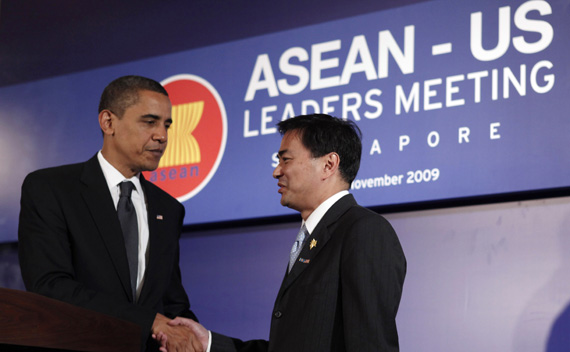A Response to “Asia Alone”
More on:

In Liz Economy’s assessment of Simon Tay’s new book Asia Alone, she writes that Tay argues that the United States should accept ASEAN as a full partner in a more multilateral Asian environment – that ASEAN is becoming a regional power of its own.
I have always enjoyed Simon Tay’s work, and I am sure that Asia Alone makes for a compelling and well-written read. However, the argument that ASEAN is becoming a regional power, an argument that I have heard increasingly from opinion leaders in Singapore, Thailand, the Philippines, and Indonesia, is, I think, flawed. ASEAN has to date served as the hub of Asian institution-building, but that is primarily because, as a relatively weak organization, it can serve as a kind of neutral player; for the same reasons, the European Union is headquartered in Belgium and not France or Germany. Since ASEAN has served as the hub of Asian institution-building, a strange dynamic has developed over the past decade. Because of this central role, ASEAN leaders, and many Southeast Asians, have begun to see the organization as increasingly powerful and important in the region, when in reality, ASEAN actually in many ways has become weaker over the past decade. This divergence is creating a kind of mismatch between ASEAN’s rising intentions and its declining reality.
How has ASEAN become weaker? For one, the states that historically have driven ASEAN’s integration – Thailand, the Philippines, Indonesia, Singapore, and Malaysia – have not, with the exception of Indonesia, developed politically over the past decade. Thailand now faces constant political crisis, the Philippines’ democracy has degenerated badly, and both Singapore and Malaysia’s ruling parties have had difficulty shedding bad habits, like using the judiciary in Malaysia to attempt to silence the opposition. With four of its core five backsliding, ASEAN continues to drift, unable to develop coherent stands on issues from the ongoing political stalemate in Burma to the increasingly authoritarian rule of the government in Bangkok, hardly giving outside partners like the United States or China confidence that they should be dealing with ASEAN instead of their typical bilateral relationships with Asian capitals. (The other members, with the exception of Vietnam, are so small or isolated they have little influence.) Indeed, though Beijing has in recent years made a big show of working multilaterally with ASEAN – and gained points in the region for it – Chinese officials privately admit that when any serious issues arise, China handles them bilaterally.
In addition, ASEAN also has failed to move forward in the key role it could play, addressing nontraditional security challenges. No one honestly expects the ASEAN Secretariat to play a major role in resolving traditional thorny bilateral security challenges, like the conflict over the South China Sea. But ASEAN could play a much larger role in nontraditional challenges like environmental degradation, piracy, migration, disease, and narcotrafficking – these are trans-border issues that could use a neutral player to help facilitate information sharing and, if necessary, mediate between countries. Again, however, ASEAN has largely failed. It remains at best a secondary player in addressing any of these nontraditional challenges, and the quality of research on these issues at the ASEAN Secretariat itself pales in comparison to the work done at the best think tanks and universities in Singapore, which generally produce the most incisive studies of ASEAN’s potential.
Given ASEAN’s continued weaknesses, then, it’s hardly surprising that all major powers in the region – the United States, China, and increasingly, India – pay lip service to working with ASEAN while they continue to handle important business bilaterally. ASEAN can demand to become a full partner in regional security, but the organization’s leading members don’t show any signs they will hold up their end of the bargain.
More on:
 Online Store
Online Store